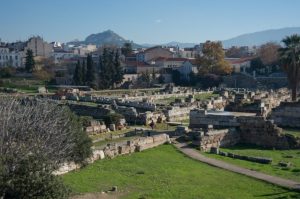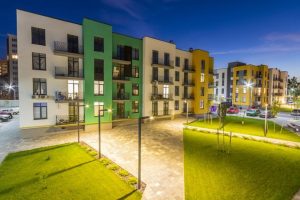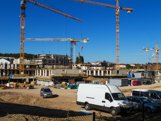Areas of Athens: where to look for real estate with potential
 For Greece, the worst is over, believes Deutsche Bank CEO John Krayan. “The light is finally visible at the end of the tunnel. The forecast for 2018 remains positive, but the road to full recovery will be long and difficult, ”the Greek publication Ekathimerini quotes him. The Statistical Office published data on the dynamics of Greece’s GDP in 2017: for the first time after an eight-year recession, Greek GDP grew four quarters in a row.
For Greece, the worst is over, believes Deutsche Bank CEO John Krayan. “The light is finally visible at the end of the tunnel. The forecast for 2018 remains positive, but the road to full recovery will be long and difficult, ”the Greek publication Ekathimerini quotes him. The Statistical Office published data on the dynamics of Greece’s GDP in 2017: for the first time after an eight-year recession, Greek GDP grew four quarters in a row.
In parallel, the flow of tourists is increasing. In 2017, the number of passengers on international destinations at Athens Airport was 14.4 million, a 12% increase from a year earlier. As a rule, foreign tourists heading to Greek resorts make their way through Athens, where they stop for a couple of days to see the sights. Against the background of economic recovery and a growing flow of tourists, investors expect an increase in real estate prices in Athens.
Taking into account the fact that while the cost per square meter in Athens is 44% lower than it was before the crisis, investors take the opportunity to buy buildings in the center of the capital, then to rent the premises for short-term rent to tourists. The more experienced acquire real estate in poor condition at a lower price in order to get a higher return on invested capital after the repair and rental.
As a result, according to the Bank of Greece, the quarterly decline in prices has already stopped: the cost per square meter in Athens from II to IV quarters of 2017 was kept at the same level. Real estate in central, most popular with tourists, areas of Athens, Kolonaki and Monastiraki, has already risen in price.
As the Greek edition of Ekathimerini writes, apartments in the “triangle” formed by the central squares of Monastiraki, Omonia and Syntagma are almost inaccessible to local people: in most cases they are already leased to tourists.
As the Greek edition of Ekathimerini writes, apartments in the “triangle” formed by the central squares of Monastiraki, Omonia and Syntagma are almost inaccessible to local people: in most cases they are already leased to tourists.
The greatest potential for investors is represented by areas located within walking distance from the Acropolis. So far, a square meter is cheaper here than in the center of the capital, and tourists are actively renting housing in such areas thanks to convenient logistics and inexpensive rental rates. According to Tranio experts, such areas include Keramikos, Kipseli, Psiri and Exarchia.
Ceramics
Ceramics is a 15-minute walk from the Acropolis, next to Ermus, Athens’s main shopping street. The nearest metro stations are Tisio and Keramikos, located on the green and blue branches, which allow direct access to Piraeus and – with a transfer to the land railway – Athens Airport.
Ceramics is popular with creative young people: while there are a lot of empty premises, rent is cheap, and the area is located in the city center. “This is something that is missing in many large European cities, and that attracts tourists,” the German edition Spiegel quoted one of the architects who settled here. Usually at the height of the working day there are no empty seats in the cafes and restaurants of Ceramikos.
In ancient times potters and masters of vase painting lived in Keramikos, from which the district got its name.
In antiquity potters and masters of painting on vases lived in Keramikos, from which the district got its name smoke-lmt.mail.ru /
According to the largest Greek real estate portal Spitogatos.gr, the average monthly rent of an apartment with one or two bedrooms in Keramikos costs 500-800 euros. To rent a house by the day, according to AirDNA (a service that processes data published on Airbnb), costs about 55 euros.
Kipseli
Kipseli is located north of the historic center of Athens, near the Field of Mars, one of the largest urban parks. Due to the fact that the area is located between two metro lines, the Acropolis, located an hour’s walk, is faster to get to land transport (40 minutes). However, the fourth (yellow) metro line will soon pass through Kipseli, the construction of which is scheduled to begin in 2019 and be completed in 2026. This is one of the largest infrastructure projects in the EU today: two radial branches will connect the city center with its northern suburbs and shorten the time on the road about three times.
Kipseli is one of the oldest, most densely populated and multicultural areas of Athens. In the first half of the 20th century, it was settled by the local bourgeoisie, houses were built with spacious apartments, and by the 1960s it became one of the most prestigious areas of Athens. However, since the 1990s, migrants from Albania, Romania, Bulgaria, Ukraine, Moldova, Russia and other countries began to inhabit the area. Most of them, according to the portal The Athens Social Atlas, have a high level of education and are financially active.



